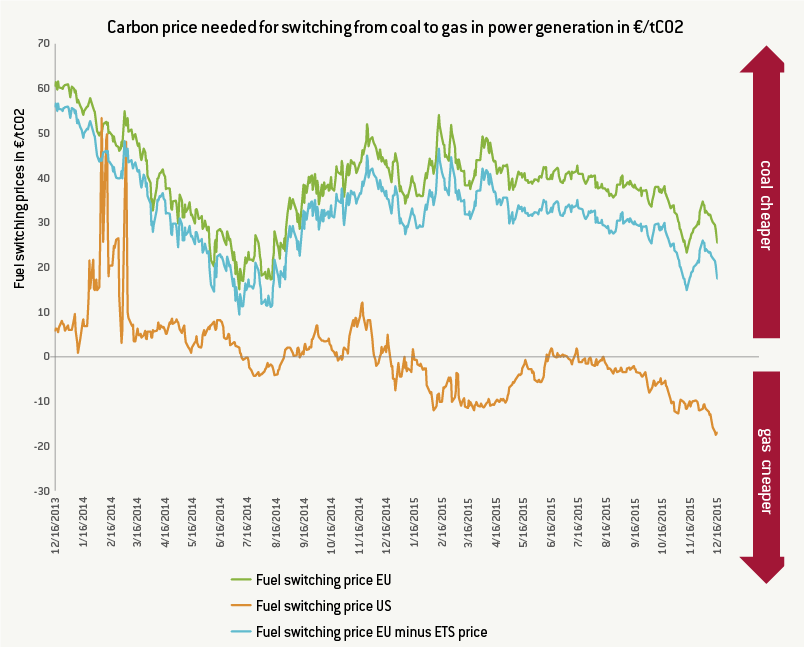When will Europe switch away from coal?

This article was originally published by Bruegel, the Brussels-based think tank. Read the article on their website here.
Despite a weak climate policy the US reduced its energy related carbon emissions by the same amount as the EU (9 percent) between 2000 and 2014.
The main reason for this remarkable drop in emissions was that US electricity producers switched from coal to less polluting natural gas in electricity production, after the shale-gas revolution cut gas prices.
The EU carbon price, the cost to companies of producing one tonne of carbon dioxide (€/t), was too low to make natural gas competitive with coal, and as a result EU electricity producers have failed to make the switch.
We present the carbon prices necessary for US and EU power production to switch from coal to gas in the graph below. This is based on the corresponding fuel prices (in the EU, CIF ARA coal and TTF gas; in the US, Appalachian coal and Henry Hub gas).

Eventually, the European emission trading system is likely to achieve such carbon prices, as every year less allowances are allocated. To make the expected future scarcity of allowances visible already in today’s prices – and thereby contribute to an earlier switch from coal to gas – we argue that the credibility of the European emission trading system should and can be strengthened (see our proposal here).
Although natural gas prices in the EU have dropped by 45% in the last two years, significantly reducing the carbon price required for switching, coal prices have also fallen by 30%. This means that for natural gas to drive out coal in EU electricity production, either gas price would have to drop by another 30% (to about 3,5 USD/MMBtu) or the carbon price would have to increase from less than 10 €/tCO2 to over 30 €/t CO2.
Note and Sources:
- Carbon ETS price: ICE-ECX EUA, from Datastream, EURO per MT
- Coal price US: Appalachian Coal, from Datastream, USD per MT
- Natural Gas price US: Henry Hub, from Datastream, USD per MMBTU
- Coal price EU: ICE API2 ARA Coal, from Datastream, USD per MT
- Natural Gas price EU: TTF, from Datastream, EURO per MW
- Heat rate for coal US, 2013: Peabody Energy, 10,555 btu/kWh
- Heat rate for coal EU, 2013 : US Energy Information Administration, 10,459 btu/kWh
- Heat rate for natural gas, 2013 : US Energy Information Administration, 7,948 btu/kWh
- Amount of fuel used per kWh (in lb) is 1.03 lb according to EIA.
- The calorific content is equal to:
- 6,000 kcal/kg for ARA, equal 10,804.57 Btu/lb
- 12,000 Btu/lb for Appalachian.
Publication does not imply endorsement of views by the World Economic Forum.
To keep up with the Agenda subscribe to our weekly newsletter.
Author: Georg Zachmann is a Senior Fellow at Bruegel.
Image: Workers unload coal from a supply truck. REUTERS/Amit Dave.
Don't miss any update on this topic
Create a free account and access your personalized content collection with our latest publications and analyses.
License and Republishing
World Economic Forum articles may be republished in accordance with the Creative Commons Attribution-NonCommercial-NoDerivatives 4.0 International Public License, and in accordance with our Terms of Use.
The views expressed in this article are those of the author alone and not the World Economic Forum.
Stay up to date:
European Union
Related topics:
The Agenda Weekly
A weekly update of the most important issues driving the global agenda
You can unsubscribe at any time using the link in our emails. For more details, review our privacy policy.
More on Energy TransitionSee all
Maciej Kolaczkowski and Debmalya Sen
November 22, 2024








